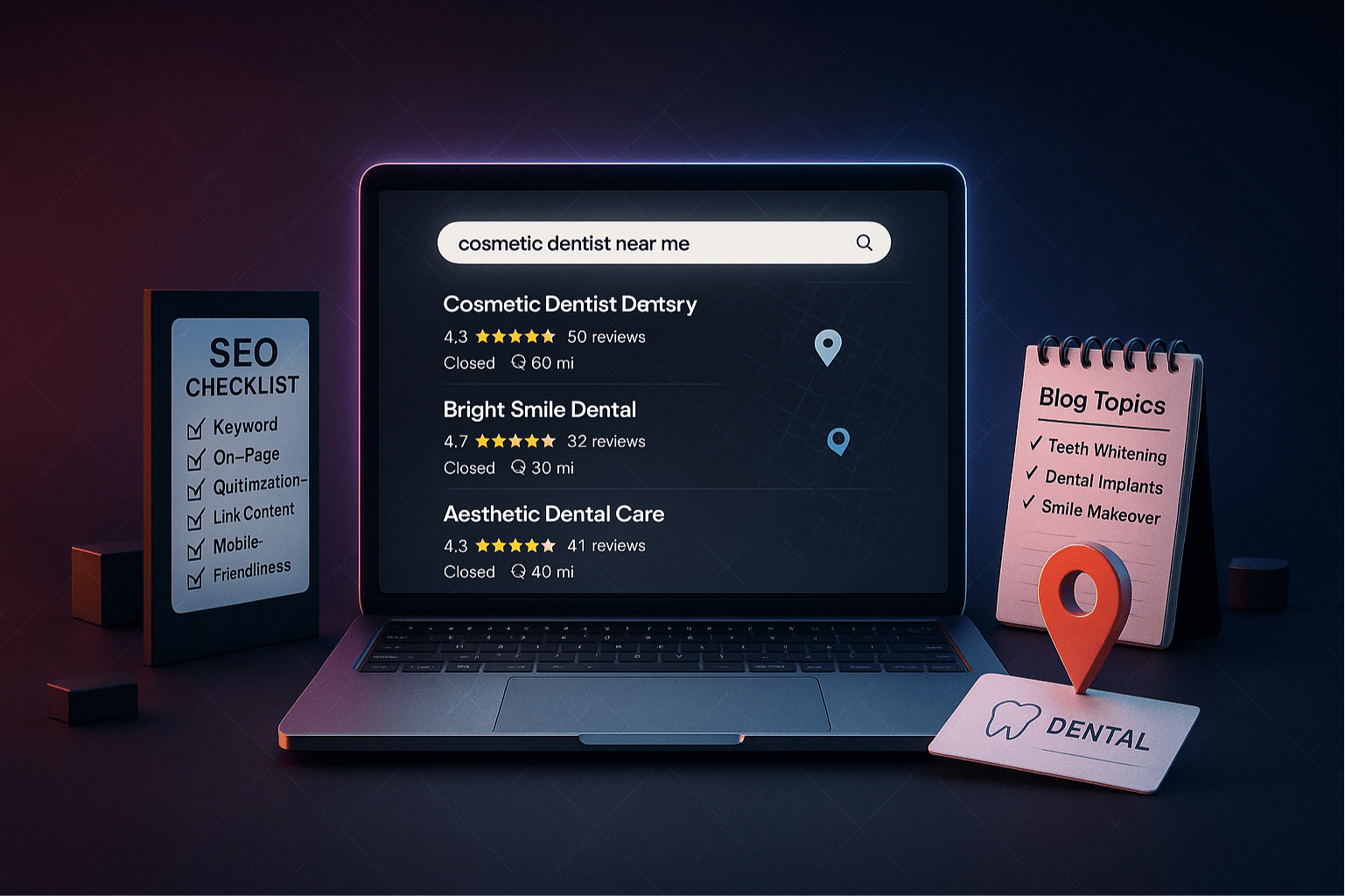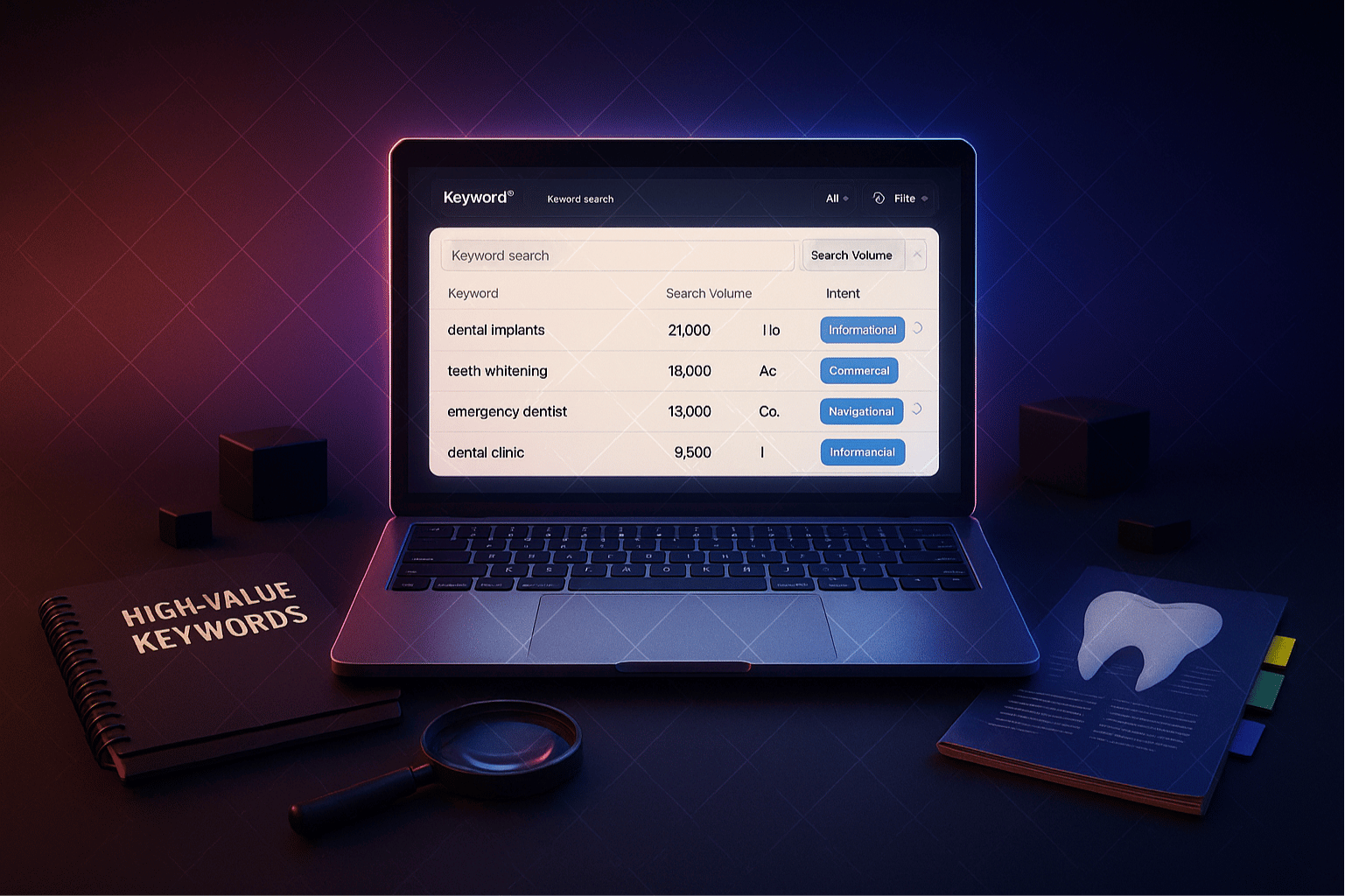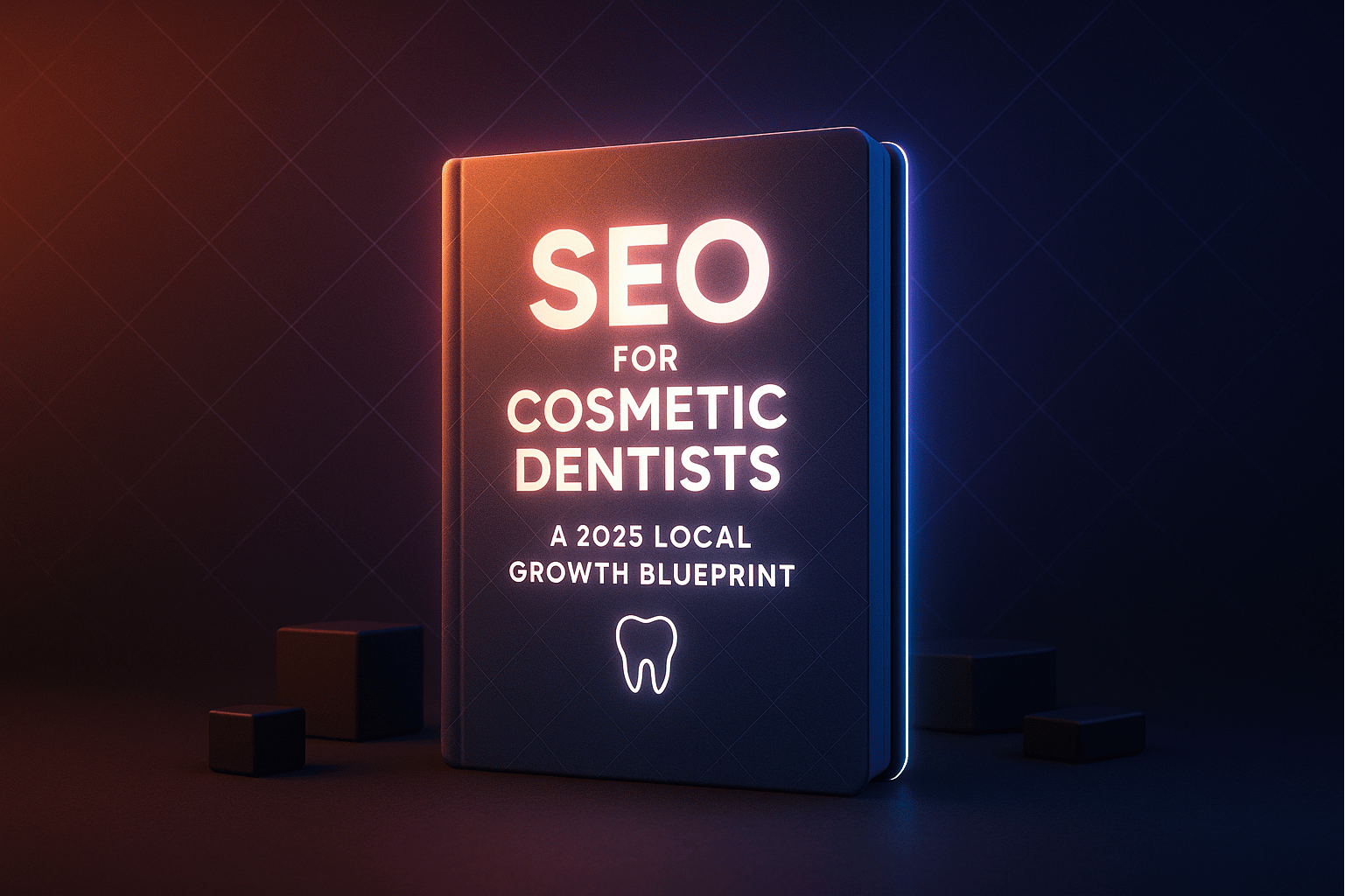Effective SEO for cosmetic dentists is critical for standing out in competitive local markets. This 2025 strategy guide covers everything from local ranking factors to content creation, helping your practice reach the ideal patients. Whether you manage your marketing in-house or work with an agency, these insights will maximize your visibility and growth.

Check our previous article: Cosmetic Dentistry Marketing Plan: 8 Proven Strategies for Growth
Why SEO Is Essential for Cosmetic Dentists
How Search Visibility Drives Patient Growth
You might be the most skilled cosmetic dentist in your city — but if your practice isn’t on the first page of Google, new patients won’t find you. Online visibility fuels consistent growth because patients now search digitally, not through referrals alone.
• Increased exposure to people already searching for cosmetic dental treatments in your area.
• Higher trust thanks to appearing on Google’s first page (patients associate ranking with credibility).
• A steady rise in consultations from organic website traffic ✅
SEO for dental practices works best when it reaches people actively looking for help — and cosmetic procedures tend to attract highly motivated searchers.
What Makes Cosmetic Dental SEO Unique
SEO for cosmetic dentists isn’t one-size-fits-all. Unlike general family dentistry, this niche focuses on elective, appearance-driven services.
• Patients are often searching for options like veneers, whitening, or Invisalign.
• Target demographics include affluent or image-conscious audiences.
• Keywords are highly competitive and typically have strong local intent.
To compete, cosmetic dental SEO relies heavily on confidence-building visuals, clear service differentiation, and strong conversion messaging.
Best Practices in Local SEO for Cosmetic Dentists
Perfecting Your Google Business Profile
Your Google Business Profile powers your visibility in map packs and “near me” searches. To stand out locally:
• Write a keyword-rich yet natural practice description.
• Keep hours, contact information, and services consistent across listings.
• Upload high-quality images of your office, team, and treatments.
• Update service categories and local areas covered at least quarterly ⚠️
NAP Consistency and Local Citations
One of the most overlooked tactics in local SEO for cosmetic dentists is NAP accuracy — your Name, Address, and Phone must be identical sitewide and on directories.
• Scan key directories like Yelp, Healthgrades, and Zocdoc for variations.
• Fix listings with old addresses or outdated team info.
• Use tools like BrightLocal or Whitespark to ensure citation consistency.
Keyword Research Tactics for Dental SEO

Finding High-Intent Cosmetic Dentistry Keywords
The best dental marketing SEO starts with targeting keywords that signal action. Avoid vague terms and focus on ones closer to booking.
• “Porcelain veneers near me” shows both intent and location.
• “Teeth whitening cost in [city]” attracts price-aware shoppers.
• “Best smile makeover dentist” brings those ready to compare and commit.
Tools to Identify Local Search Opportunities
Whether you’re using Ubersuggest, Semrush, or Google Keyword Planner, invest time in finding underused phrases with buying intent.
• Filter keywords by ZIP code or metro area to catch regional patterns.
• Cluster terms by treatment to discover what locals want (e.g., composite bonding vs veneers).
• Add long-tail and question-based terms competitors may ignore.
On-Page SEO Optimizations for Cosmetic Dental Sites
Optimizing Meta Tags and Headers Strategically
Strong on-page SEO is how each internal page contributes to your cosmetic dental marketing as a whole. Each one should include:
• A clear title tag with your core keyword early on.
• A compelling meta description that fits under 160 characters.
• Structured H1/H2s that match what patients are actually searching for.
Crafting Service Pages That Rank and Convert
Each procedure deserves its own dedicated landing page — that helps both patients and Google understand what you offer.
• Keep each page focused on one treatment (like “Teeth Whitening in Austin”).
• Explain the process clearly, with real timelines and outcomes.
• Reinforce trust with testimonials and before-and-after results.
When patients search “cosmetic dentist near me,” your content is what earns the next click — or scroll.
Content Marketing Strategies That Build Authority
Creating Educational Blog Content
Educational posts not only support rankings — they close knowledge gaps and reduce calls with repeat questions. A few winning examples:
• “What to expect after getting veneers”
• “Is teeth whitening bad for enamel?”
• “How much does a smile makeover really cost?”
Cosmetic dental SEO blogs also double as resources for your front desk team and for email follow-ups.
Tapping into Before-and-After Success Stories
Nothing builds patient confidence like showing real transformations. In every case study:
• Include clear side-by-side images of the patient’s smile before and after.
• Feature a quick testimonial — even two sentences work.
• Add a strong call-to-action with how to schedule a consultation 🤝
Technical SEO Must-Haves for Dentists in 2025
Boosting Site Speed and Mobile Experience
Mobile-first performance isn’t optional anymore. Make sure your site meets today’s standards:
• Compress large before-and-after images without losing quality.
• Use responsive design and touch-friendly layouts.
• Eliminate bloated scripts or extra plugins that slow things down ⚠️
Implementing Structured Data with Schema Markup
Schema markup gives Google more context about your services and can improve visibility in search features.
• Add structured data to highlight services like “Invisalign” or “Smile Makeovers.”
• Display patient reviews directly in your search preview.
• Enable “Book Appointment” buttons via local business schema.
Link Building Techniques for Cosmetic Practices
Partnering with Local Influencers and Directories
Backlinks are a ranking signal — but relevant ones matter most. Build stronger SEO by:
• Collaborating with local beauty or lifestyle influencers.
• Getting listed in niche-specific directories for dental marketing.
• Publishing guest blogs for regional wellness publications.
Earning Backlinks Through Community Engagement
Want real-world trust that boosts your search presence too? Get involved offline.
• Host or sponsor pop-up smile days at fairs or fitness centers.
• Give a deserving patient a smile makeover and pitch the story to local media.
• Publish press releases highlighting local impact or contests.
⚠️ Local backlinks tied to real community impact are worth more than low-quality mass submissions.
Tracking Performance with Dental SEO KPIs

Top Metrics to Monitor Your Local SEO Success
Measurement matters — traffic means nothing if it doesn't lead to patients.
• Track organic search traffic broken down by city or ZIP code.
• Monitor phone call and online booking conversions from Maps or local rankings.
• Use direction requests and map pins as local interest signals.
Using Google Analytics and GSC Effectively
Two free tools can uncover what’s working — and what needs fixing.
• Google Analytics tracks how long users stay, what they click, and bounce rate.
• Google Search Console shows keywords driving impressions and clicks.
• It also flags mobile and indexing issues that affect visibility 📉
Reputation Management and Patient Reviews
Encouraging Positive Google Reviews
Reviews play a direct role in ranking and trust. Ask for them while the patient is still smiling.
• Ask at the end of an appointment, while results are fresh ✅
• Automate gentle reminders via text or email.
• Include a direct link to your Google Business Profile.
Responding to Patient Feedback Professionally
Your responses reflect your brand, for better or worse — even when replying to criticism.
• Thank patients by name (if included publicly).
• Address negative feedback gracefully and without breaking HIPAA.
• Stay calm and respectful, even when the comment isn’t fair.
SEO for cosmetic dentists isn’t just about traffic — it’s about trust, visibility, and attracting the right patients. Whether you handle SEO in-house or partner with experts, consistency is key. Start local, lead with expertise, and always aim for connection over clicks.
Check our next article: Professional Medical Web Site Design That Grows Your Practice
Ready to dominate local search results? Book your free SEO audit for cosmetic dentists today!
Seo for cosmetic dentists
How can SEO help highlight high-value cosmetic procedures?
What's the role of photo galleries in cosmetic dentistry SEO?
Is voice search optimization important for cosmetic dentists?
How does SEO support seasonal cosmetic dental promotions?

.svg)


.svg)
